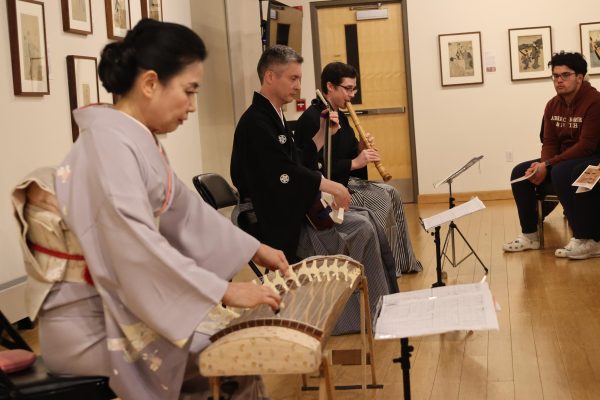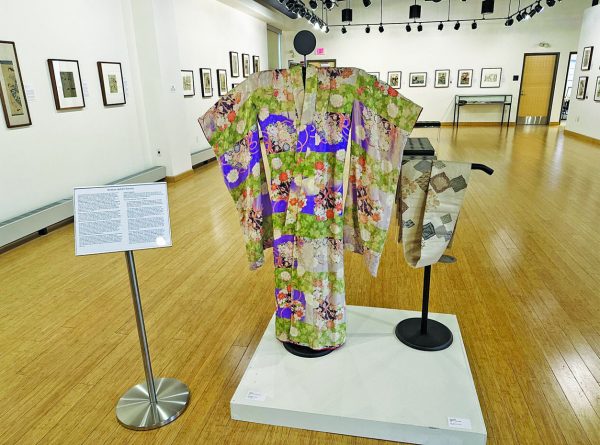Working Students Brave Grueling Path to Uncertain Future

Senior communications major Erin Dougherty working at III Guys Restaurant and Sports Bar.
March 2, 2016
As she left her Saturday night shift at 1:00 a.m. at Appletree restaurant in Dallas, Taryn Talacka dreaded driving to Mezz 5, the communications classroom, to finish an episode for Hey You, MU! Talacka was covered in vodka sauce and had a messy bun with pieces of dark hair falling out as she began to produce another episode. Brushing hair from her face and eyes, she made the final edits for yet another show to email to advisor Dan Kimbrough before the morning. After she timed each and every segment and commercial to precisely hit the 30-minute mark, she finally finished by 2:30 Sunday morning. Knowing she had work at Balance Yoga Studio in Kingston early the next morning and put in another long night shift at Appletree, Talacka decided to sleep on the aged, green dorm couch that rests against the classroom wall.
“Not a fun night, but it needed to get done,” Talacka said.
Sommer Gaydos, a student at Mansfield University, sprinted out the doors, and exited from her 2:30-3:20 Delinquency and the Juvenile Justice System class. She got into her white 2001 Chevy Trailblazer, lobbed the keys into the ignition, checked her mirrors, and hoped no one was behind her. As Gaydos raced down the highway, she began the two hour commute home. She anxiously checked the clock every few minutes, determined to make it to her minimum-wage theater job on time. She had already come up with an excuse for being a few minutes late.
“It’s more than a struggle,” said Gaydos. “If I ever want a day off, I lose out on the extra money that I need to get by. It’s frustrating.”
Gaydos said that while working as a college student can be trying at times, it’s worth it.
“It’s nice to be able to have the extra money to do things or buy extra things, as well as to put money aside for my college bills. I know it will pay off in the end. Luckily, I work with all of my closest friends, so it’s almost a win-win situation for me.”
Most students who work during college live lives very similar to those of Talacka and Gaydos. College tuition rose 8.3% in the last year and job wages have stagnated, causing some students to ask themselves if college is even worth it. The average college student works part-time, 15-20 hours per week, which some may consider an “easy” workload, but it isn’t enough considering that the cost of college has leaped six-fold since the 1980s, according to a report from the State Higher Education Officers Association.
So most people have to borrow. Nearly one in five American households now have student loan debt, according to a study by the Pew Research Center. Students are bearing more of the financial burden because most states have cut funding for higher education since the recession. States are spending 10.8% less this year, which is contributing to the rising tuition and growing student debt.
But that doesn’t mean people who finished college decades ago had it too much better.
President Thomas Botzman did not have it easy. During his college years, Botzman had an array of jobs – everything from a volleyball refereeing, to filming, to working in the kitchen of a small restaurant.
“I wasn’t making much at the restaurant. I washed dishes for $2 an hour, and sometimes tips, which I would be excited about – an extra $6. That was a lot back then.”
As one of 13 children in his family, the only way he could afford college was to get jobs, meet people, and pay it forward.
“I came out with $20,000 in students loans. It’s just something I had to do. But the value I got out of going to school made everything worth it. I never imagined working here as the president of a university, but my connections furthered my career in numerous ways.”
Many colleges recommend or mandate that students only work 10 to 15 hours a week, according to the Department of Labor. Some students may find this useful, but others find it frustrating because they need the money to live.
Parents are also contributing less toward their child’s education. Three years ago, parents paid for 37 percent of their children’s tuition on average. Today, they only contribute 27 percent, which means that students need to earn that extra money while studying.
When financial times in her family got tough, Talacka put her family first. She dropped her extra-curricular activities at the university to make time for her second part-time job at Appletree.
Talacka is a jack-of-all-trades with her three jobs. From scrubbing toilets to video editing, she seems to do it all.
She takes care of clients’ needs, tidies up the yoga studio, and manages cash and credit card payments. She also handles the social media of the studio when her boss needs her to, and she’s even made a few freelance videos for the studio.
At Appletree, she waitresses banquets and takes care of guest needs. She also cleans up the ballroom after parties.
Her perseverance led her to win an internship at News 12 New Jersey, which later offered her a job and changed her life.
“I applied for an associate producer position, got the job, and began working there in August. I worked once a month there during the semester because it was a two and a half hour drive to New Jersey and back, but I was able to make it work because my boyfriend’s family lets me live with them.”
At her New Jersey job, she writes VOs, VO/SOTs and a lot of other copy for her news show. Essentially, she writes what the news anchor reads.
“Even though I can have a mountain of assignments waiting for me when I get off my shift, I have to keep my cool when I’m at the studio, waitressing, or writing at News 12. I want to be a professional at work, so I try to never let my personal life bother me there. I also pull a lot of late nights working on assignments. It’s not easy, but I’m providing for myself and I definitely know the value of a dollar.”
Like most students who balance work and school, Talacka struggled most with time management, but she is able to cognitively compartmentalize the duties, and she doesn’t let her mind wander.
“I really hated when I worked double shifts on weekends. There was one time when I worked on a Saturday from 7:45 a.m. to 11:30 a.m. at Balance and 3:00 p.m. to 1:30 a.m. at Appletree, and then Sunday from 9 to 11:30 a.m. at Balance and noon to 8:00 p.m. at Appletree. My whole weekend was basically gone right there. Those weekends really wore me out, because I had little time to do my schoolwork and my sleep schedule was off. I managed to get everything done and keep my grades up, but it wasn’t easy. I skipped a lot of meals, didn’t do anything for myself, and barely saw my friends and family.”
Stress is a leading complaint among many students. Talacka said she was eventually able to figure out a balance, but that may not come easily to others. Students can work so much that their jobs interfere with their college goals and academic progress.
Kassie Williams, a physician’s assistant student, found that her major required too much after school and weekend studying to enable her to maintain her job at a local bank.
“I was too stressed from school. I had a lot of work to do and my job was on Saturdays starting in the morning. I felt like I needed one day in the week where I could sleep in and take a break from school to do things like hanging out with friends and family.”
Not only are students worried about their current finances, but they wonder whether their future careers will enable them to pay off student loans. New homes or new cars will have to wait.
Student loans have become an increasingly important source of financial aid for college students.Between 1992–93 and 2000–04, the proportion of all undergraduates borrowing in a given year to help pay for their education increased from 20 to 35 percent at the undergraduate level, and from 19 to 42 percent at the graduate level.
As borrowing has increased, long-standing concerns about students’ ability to repay their loans and the effect of the debt on their lives after college have intensified.
Student loan debt has the largest impact on poor and middle class Americans, who devote large chunks of their household incomes to student debt. The poorest fifth have student debt that amounts to roughly a quarter of their household income, while the share is much lower for wealthier Americans.
The richest share of households, not surprisingly, is better able to handle the burden. College debt accounted for only 3.3% of their household income.
Bachelor’s degree recipients who do not immediately enter graduate school typically must begin making monthly payments on their loans six months after they finish college. The standard repayment period is 10 years, with a minimum monthly payment of $50, but alternative repayment plans exist to help borrowers who have difficulty meeting their obligations.
And with loans like the Perkins Loan Program, which serves students with significant financial need, in limbo, the federal government is making it more difficult to pay for school.
President Botzman urges students to get involved and let representatives know how important a college education is for the nation’s future.
President Botzman is not entirely sure that things will get better. He believes there was a public value of education that does not exist anymore.
“Going to college is a part of an investment you must be willing to make. It is not only an investment though. It is important that you see the value in your education. There are certain things that you can get here, that you can’t get anywhere else. Invest in yourself. Invest in time, talent, treasure and community.”
Botzman said education is not all about money or profit.
“Do all your business with a mission. Too many people measure salary alongside success. Do good things. Get to know your true self, limitations and beyond. It’s so important to deliver your value to the world.”






